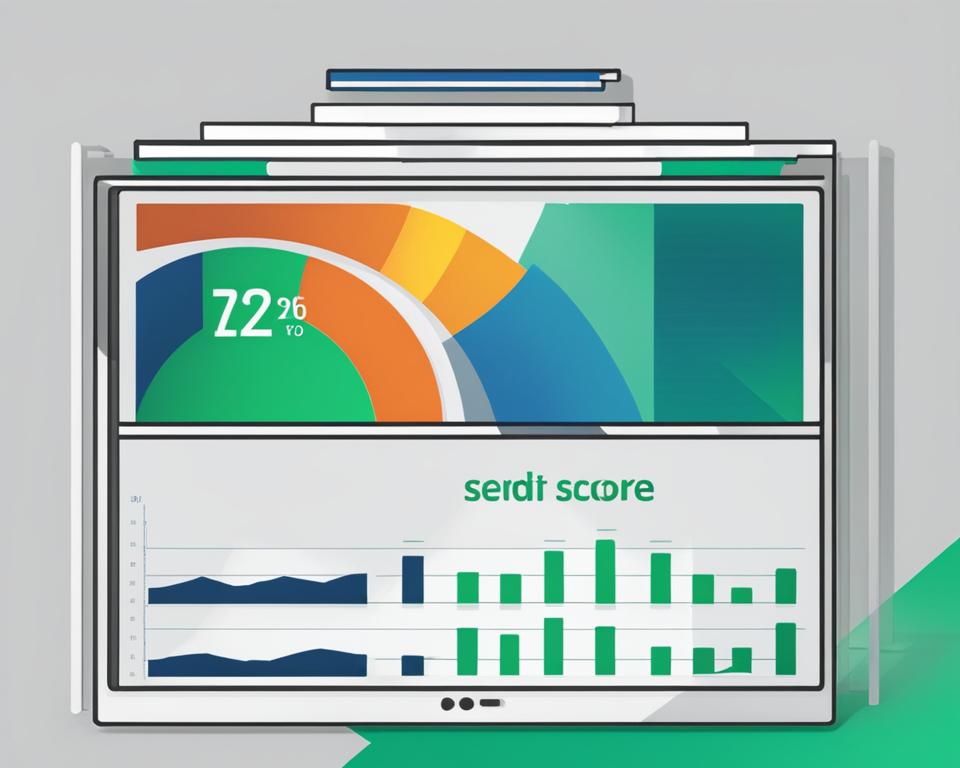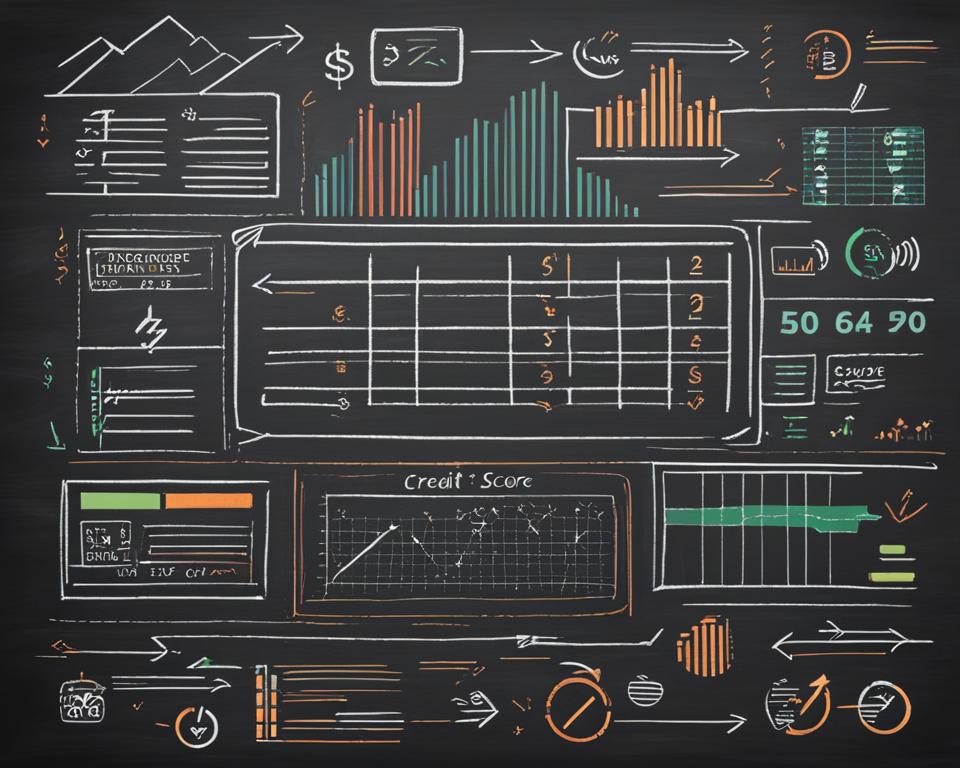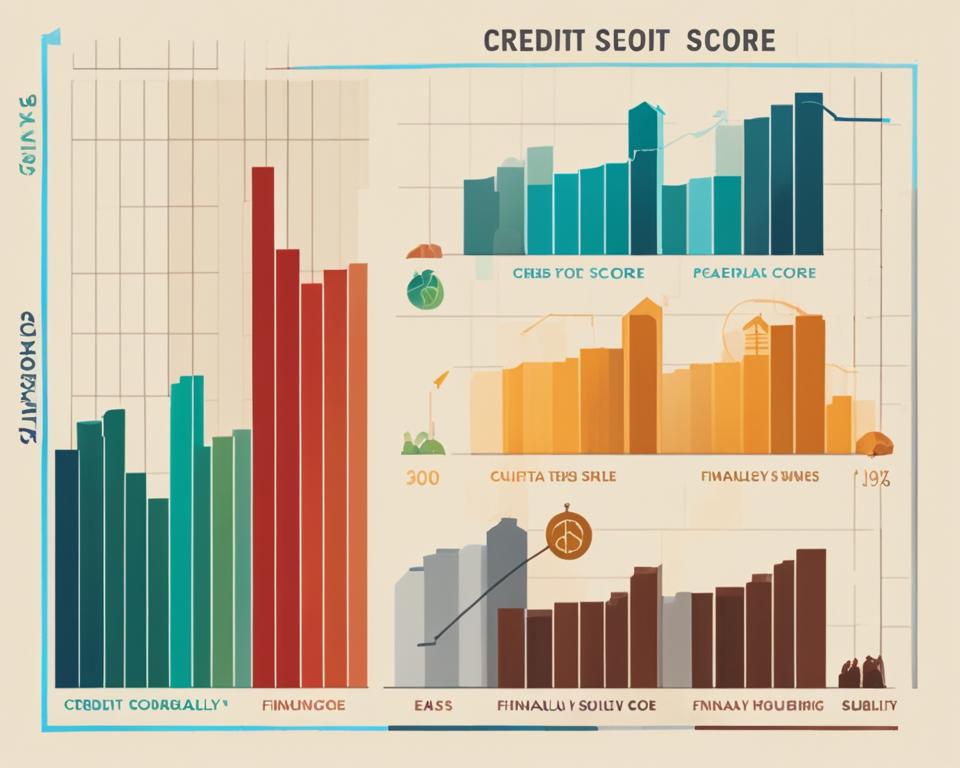When you first check your credit scores, you might be surprised to find that you already have a three-digit number, even if you’ve never used credit before. Your credit score doesn’t start at zero; the lowest possible score is 300 according to FICO® and VantageScore®. However, if you haven’t established any credit history, you likely won’t have a score at all. Credit scores are calculated based on several factors, including payment history, current debt, credit utilization, credit mix, credit age, and new credit applications. Once credit is established, credit scores typically range from 300 to 850.
Key Takeaways:
- Your starting credit score can be as low as 300 if you have no credit history.
- Credit scores are calculated based on factors such as payment history, current debt, and credit utilization.
- Once credit is established, credit scores range from 300 to 850.
- Knowing your credit score is important for understanding your creditworthiness.
- Establishing and maintaining good credit is vital for financial health.
What Credit Score Do You Start With?
When it comes to starting credit scores, there isn’t a set number that applies to everyone. Your credit score at the beginning of your credit journey will depend on several factors.
If you have never had any credit history, it’s likely that you won’t have a credit score at all. Credit scores are not automatically calculated. Instead, they are generated when a lender or other entity requests them to determine your creditworthiness.
The credit-scoring models used to calculate credit scores can vary. The two most commonly used models are FICO and VantageScore. Both models have their own algorithms and criteria for determining credit scores.
To establish a starting credit score, it’s important to focus on building a positive credit history from the beginning. This includes using credit responsibly, making timely payments, and keeping your credit utilization low.
How Is Your Starting Credit Score Calculated?
Your starting credit score is determined by a variety of factors that directly impact your creditworthiness. Understanding these factors will help you navigate the world of credit and make informed financial decisions. The primary components that contribute to your starting credit score include:
- Payment History: Your track record of making timely payments plays a significant role in determining your credit score. Consistently paying your bills on time demonstrates responsible financial behavior.
- Current Debt: The amount of debt you currently owe is another crucial factor in calculating your credit score. High levels of debt might indicate potential financial strain and can lower your credit score.
- Credit Utilization: This refers to the percentage of your available credit that you are currently using. Keeping your credit utilization ratio low demonstrates responsible credit management and can positively impact your score.
- Credit Mix: Lenders consider the types of credit accounts you have, such as credit cards, loans, and mortgages. Having a healthy mix of credit can show your ability to manage multiple financial responsibilities.
- Credit Age: The length of your credit history plays a role in determining your starting credit score. A longer credit history demonstrates stability and responsible credit management.
- New Credit Applications: Applying for multiple credit accounts within a short period can be seen as a red flag by lenders. This can negatively impact your credit score. It’s essential to be selective about new credit applications and only borrow what you need.
To put it simply, your starting credit score is a snapshot of your creditworthiness at the beginning of your credit journey. By understanding the factors considered in the calculation, you can take steps to build a strong credit foundation and improve your credit score over time.

Note: The image above provides a visual representation of the various factors that contribute to your credit score.
Credit Score Ranges
Understanding the range of credit scores is essential for assessing your creditworthiness and monitoring your progress in building credit. The two leading credit-scoring companies, FICO and VantageScore, categorize credit scores into specific ranges, helping individuals gauge where they stand in the credit landscape.
FICO scores range from 300 to 850, with different score categories indicating different levels of creditworthiness. A higher FICO score signifies better creditworthiness and can potentially provide access to more favorable loan terms and lower interest rates. Here is a breakdown of the FICO credit score ranges:
| FICO Credit Score Range | Credit Category |
|---|---|
| 300 – 579 | Poor |
| 580 – 669 | Fair |
| 670 – 739 | Good |
| 740 – 799 | Very Good |
| 800 – 850 | Exceptional |
VantageScore, the credit-scoring model developed by the three major credit bureaus (Equifax, Experian, and TransUnion), also ranges from 300 to 850. The VantageScore categories align closely with FICO, providing similar assessments of creditworthiness. Here are the VantageScore credit score ranges:
| VantageScore Credit Score Range | Credit Category |
|---|---|
| 300 – 499 | Poor |
| 500 – 600 | Fair |
| 601 – 660 | Good |
| 661 – 780 | Very Good |
| 781 – 850 | Excellent |
Knowing the range in which your credit score falls enables you to assess your credit health and make informed decisions to improve your creditworthiness. Monitoring your credit score regularly and understanding the factors that influence it can help you set financial goals, establish positive credit habits, and achieve long-term financial success.
Brief Quote: “Understanding the credit score range and where your score falls is crucial for managing your financial future effectively.” – Credit Expert
At What Age Does Your Credit Score Start?
When it comes to credit scores, most people won’t have a credit report or score until they turn 18. Why is that? Well, in order to open a credit card in your own name, you typically need to be at least 18 years old. So, if you’ve never used credit before, you won’t have a credit score or report to speak of.
However, once you reach that milestone age and become eligible to start borrowing on your own, such as opening credit accounts or taking out loans, that’s when you’ll begin to see credit scores and reports associated with your name. It’s an exciting time because it marks the start of your credit journey.
But there’s also another way you might find yourself with credit scores and reports even before you turn 18. If you’re added as an authorized user to someone else’s credit account, such as a parent or guardian, their account activity may appear on your credit reports. This can give you a head start in building credit before you’re officially old enough to have credit in your own name.
So, while the exact age at which your credit score starts can vary depending on your individual circumstances, turning 18 is often a significant milestone. It’s the age at which you gain more financial independence and can begin to shape your credit history.
How to Establish and Maintain Good Credit
Building credit is a process that requires strategic financial decisions and responsible credit use. Whether you’re just starting to establish credit or working on maintaining a good credit score, there are several effective strategies to consider.
1. Secured Credit Card
One option to establish credit is by applying for a secured credit card. A secured credit card requires a security deposit, which serves as collateral for the credit limit. By responsibly using a secured credit card, making timely payments, and keeping credit utilization low, you can build a positive credit history over time.
2. Authorized User
Becoming an authorized user on someone else’s credit card can also help you establish credit. As an authorized user, you can make purchases using the primary account holder’s credit card, and their payment history will be reflected on your credit report. It’s important to choose a trustworthy primary account holder who has a good credit history.
3. Credit-Builder Loan
Credit-builder loans are specifically designed to help individuals establish or improve their credit. These loans are offered by credit unions and require you to make small payments over time. The payments are reported to credit agencies, allowing you to demonstrate responsible credit use and build a positive credit history.
By utilizing these strategies, you can take proactive steps towards establishing and maintaining good credit. It’s important to remember that building credit takes time, so be patient and consistent in your efforts.
| Strategy | How it Works |
|---|---|
| Secured Credit Card | Requires a security deposit; helps build credit through responsible use. |
| Authorized User | Allows you to make purchases using someone else’s credit card; their payment history reflects on your credit report. |
| Credit-Builder Loan | Makes small payments over time; reported to credit agencies to establish a positive credit history. |
Is It Possible to Have a Credit Score Without a Credit Card?
While a credit card is often associated with building credit, it’s important to note that having a credit score doesn’t necessarily require a credit card. Your credit score is not solely based on credit card usage, but rather on various factors related to your credit history.
There are different types of credit accounts that can contribute to building a credit score. These include installment loans, open credit accounts, and even retail accounts. As long as the activity on these accounts is reported to the credit bureaus, it can positively impact your credit score.
Types of Credit
There are two main types of credit: revolving credit and installment credit.
- Revolving credit: This type of credit allows you to borrow up to a certain limit and make minimum payments each month. Credit cards are a common example of revolving credit accounts. The responsible use of a credit card can demonstrate your ability to manage debt and make timely payments, which can help build a positive credit history.
- Installment credit: With installment credit, you borrow a specific amount and repay it over time with a fixed number of payments. Examples include auto loans, student loans, and personal loans. Making regular, on-time payments toward installment loans can also demonstrate responsible credit behavior and contribute to a healthy credit score.
It’s worth noting that credit history and credit score are not solely tied to credit cards. Building credit through other types of credit accounts can be just as effective in establishing a positive credit history.
“Your credit history and credit score are not solely tied to credit cards.”
Risk and Creditworthiness
Lenders and creditors assess your creditworthiness by considering various factors, including your credit history, payment history, and overall credit usage. These factors help them determine the level of risk associated with lending to you.
When assessing your creditworthiness, lenders consider the mix of credit types you have utilized. Having a diverse credit portfolio that includes both revolving and installment credit can demonstrate your ability to handle different types of financial obligations.
Ultimately, it’s important to remember that responsible credit use and consistent, on-time payments are key to building and maintaining a good credit score, regardless of the specific types of credit accounts you have.
A Visual Comparison of Credit Types
| Credit Type | Definition | Examples |
|---|---|---|
| Revolving Credit | Credit that allows you to borrow up to a set limit and make minimum payments. | Credit cards, retail accounts |
| Installment Credit | Credit that involves borrowing a fixed amount and repaying it with a specific number of payments. | Auto loans, student loans, personal loans |
By understanding the different types of credit and the ways they can contribute to your credit history, you can make informed decisions about building and managing your credit. Remember to always use credit responsibly, make timely payments, and monitor your credit reports regularly to ensure accuracy.
How to Monitor Your Credit Score
Monitoring your credit score is an essential part of managing your financial health. Regularly keeping track of your credit score allows you to stay informed and take necessary steps to improve or maintain it. Here are some key ways to monitor your credit score:
1. Check your credit reports
Obtain free copies of your credit reports from all three major credit bureaus – Equifax, Experian, and TransUnion – once a year through AnnualCreditReport.com. Reviewing your credit reports helps you identify any errors or discrepancies that may be negatively impacting your credit score.
2. Use tools like CreditWise
CreditWise, a service offered by Capital One, allows you to monitor your VantageScore 3.0 credit score for free. This tool provides insights into the factors affecting your score, alerts you to any significant changes, and offers personalized recommendations for improving your creditworthiness.
3. Stay informed about credit bureaus
Keep yourself updated on the latest news and developments from credit bureaus. Stay informed about any changes in their reporting practices, credit score models, or data security measures that may impact your credit score.
4. Set up credit score alerts
Many credit monitoring services and financial institutions offer the option to receive credit score alerts via email or mobile notifications. These alerts can help you stay on top of any changes or fluctuations in your credit score, allowing you to take immediate action if needed.
5. Monitor your credit utilization
In addition to your credit score, it’s important to keep an eye on your credit utilization ratio. This ratio represents the percentage of your available credit that you are currently using. It’s generally recommended to keep your credit utilization below 30% to maintain a healthy credit profile.
6. Take action to improve your credit
If you notice any negative or inaccurate information on your credit reports or if your credit score is lower than desired, take proactive steps to address the issues. This may involve disputing errors, paying off outstanding debts, or seeking professional assistance, such as credit counseling.
By actively monitoring your credit score and staying informed about your credit reports, you can make informed financial decisions, detect any potential issues early on, and work towards achieving a healthier credit profile.
| Credit Monitoring Tips | Benefits |
|---|---|
| Regularly check your credit reports | Identify errors or discrepancies |
| Use tools like CreditWise | Monitor your VantageScore 3.0 credit score for free |
| Stay informed about credit bureaus | Keep up-to-date with changes that may impact your score |
| Set up credit score alerts | Receive notifications of any score changes |
| Monitor your credit utilization | Manage your credit balances effectively |
| Take action to improve your credit | Address any negative or inaccurate information |

“Monitoring your credit score regularly gives you the power to make informed financial decisions and take control of your credit future.” – CreditWise Expert
Starting Credit Scores in a Nutshell
Your credit scores don’t start at zero, even if you’ve never had any type of credit before. Building credit is crucial, and establishing positive financial habits from the beginning can help you continue building better scores. It’s essential to understand that everyone’s credit journey is different, and there’s no set credit score that every person starts out with. By focusing on responsible credit use and making timely payments, you can improve your credit scores and achieve your financial goals.
When it comes to credit scores, starting from scratch doesn’t mean starting from the bottom. Even if you’ve never had any type of credit before, your credit score doesn’t start at zero. Building credit is an important step towards securing your financial future, and it’s never too early to start. By establishing positive financial habits and being mindful of your credit usage, you can pave the way for a strong credit history and a higher credit score.
It’s important to understand that each person’s credit journey is unique, and there’s no fixed credit score that everyone begins with. Your starting credit score will depend on several factors, including your credit history, credit applications, and payment history. By adopting positive financial habits from the start, such as making payments on time and keeping your credit utilization low, you can set yourself on the path to a higher credit score.
Building credit is about more than just achieving a good credit score; it’s about establishing a solid foundation for your financial future. Responsible credit use, such as paying your bills on time and in full, is crucial for maintaining a positive credit history. The habits you develop early on can have a significant impact on your credit score and financial well-being in the long run.
To summarize, starting credit scores are not zero; they reflect the credit habits and history you have built or are just starting to build. The importance of building credit cannot be overstated, as it lays the groundwork for financial opportunities, such as qualifying for loans or obtaining better interest rates. By practicing good financial habits from the beginning, you can chart a path towards a strong credit score and a healthier financial future.
Credit Score Factors
Understanding the factors that influence your credit score is essential for effectively managing your credit. Credit-scoring companies like FICO consider various factors to assess your creditworthiness and determine the level of risk associated with lending to you. These factors include:
- Payment History: Making payments on time is the most crucial factor in determining your credit score. Consistently paying your bills and obligations demonstrates responsible financial behavior.
- Amount Owed: The total amount of debt you owe is also a significant factor. High levels of debt can negatively impact your credit score.
- Length of Credit History: The length of time you’ve had credit accounts plays a role in your credit score. Generally, a longer credit history demonstrates stability and responsible credit management.
- New Credit: Opening new credit accounts or having too many recent credit applications can lower your credit score. Lenders may consider multiple credit applications within a short period as a sign of financial distress.
- Credit Mix: Having a diverse range of credit types, such as credit cards, loans, and mortgages, can positively impact your credit score. It indicates that you can responsibly manage various types of credit.
By understanding these credit score factors, you can focus on maintaining positive financial habits to improve your creditworthiness. Remember to make timely payments, keep your debt levels manageable, establish a long credit history, minimize new credit applications, and maintain a healthy mix of credit types.

“Your credit score is influenced by various factors, including your payment history, amount owed, length of credit history, new credit applications, and credit mix.”
Credit Score Calculation
The specific calculation method for credit scores is not revealed by FICO, but the factors used in the calculation are well-known. The credit score calculation incorporates several key factors that contribute to determining an individual’s creditworthiness.
- Payment History: This factor assesses the borrower’s track record of making timely payments on their credit obligations.
- Amount Owed: The amount owed refers to the total outstanding debt and the borrower’s credit utilization ratio.
- Length of Credit History: The length of credit history measures the duration for which the borrower has had active credit accounts.
- New Credit Applications: When a borrower applies for new credit, it can temporarily lower their credit score.
- Credit Mix: A diverse mix of credit types, such as credit cards, loans, and mortgages, can positively impact the credit score.
While payment history and the amount owed carry the most weight in the calculation, each factor plays a crucial role in determining the credit score. The credit score is then derived from the information collected by the credit bureaus and provided in the borrower’s credit report.
Understanding how these factors contribute to credit score calculation can help individuals make informed decisions to improve their creditworthiness.
| Factors | Importance | Description |
|---|---|---|
| Payment History | High | Assesses the borrower’s track record of making timely payments on their credit obligations. |
| Amount Owed | High | Refers to the total outstanding debt and the borrower’s credit utilization ratio. |
| Length of Credit History | Moderate | Measures the duration for which the borrower has had active credit accounts. |
| New Credit Applications | Low | When a borrower applies for new credit, it can temporarily lower their credit score. |
| Credit Mix | Low | A diverse mix of credit types, such as credit cards, loans, and mortgages, can positively impact the credit score. |
What Isn’t Included in Credit Score Calculation
Credit score calculations are based solely on the information contained in your credit report. Factors such as your age, income, and employment history are not included in the calculation. Additionally, utility bills and rental payment history typically do not contribute to your credit score unless specific arrangements are made to report this information.
It’s important to regularly monitor your credit report for accuracy and address any discrepancies. By doing so, you can ensure that the information used for credit score calculations is up to date and reflects your true financial standing.
“Your credit score is only as good as the information in your credit report. Regularly checking your credit report and addressing any errors or discrepancies is essential for maintaining good credit.”
While your age, income, and employment history may not directly impact your credit score, they can still play a role in lenders’ decision-making processes when evaluating creditworthiness for certain loans or financial products.
It’s important to note that the focus of credit score calculations is primarily on your credit management and repayment history rather than external factors like age or income. Maintaining positive credit habits and responsible financial behavior are key to achieving and maintaining a good credit score.

What Is Included in Credit Score Calculation?
When it comes to credit score calculations, the following factors are typically taken into account:
- Payment history: The timeliness and consistency of your credit payments.
- Amount owed: The total amount of outstanding debt you have.
- Length of credit history: The age of your credit accounts and the average age of all your accounts.
- New credit: The number of recent credit inquiries and new credit accounts opened.
- Credit mix: The variety of credit types you have, such as credit cards, loans, and mortgages.
These factors serve as indicators of your creditworthiness, allowing lenders to assess the risk involved in lending to you. By understanding how these factors contribute to your credit score, you can make informed decisions about your financial habits and take steps to improve your creditworthiness.
How Often Is a Credit Score Calculated?
Understanding how often your credit score is calculated is crucial for managing your financial health. Credit scores are typically calculated on a monthly basis, as lenders and creditors typically report information to credit bureaus monthly. However, it’s important to note that the frequency of credit score updates can vary depending on your individual circumstances and the reporting practices of lenders. Here’s a closer look at how credit score calculation and reporting frequency work:
Monthly Reporting by Lenders
The calculation and updating of credit scores are closely tied to the reporting habits of lenders and creditors. These entities provide information to the credit bureaus, such as your payment history, credit utilization, and new credit applications. As such, your credit score is most likely to be recalculated and updated on a monthly basis, reflecting any changes in your financial behavior and credit-related activities.
By reporting monthly, lenders ensure that the credit bureaus have the most recent and accurate data to calculate credit scores. This regular reporting allows for a more reflective assessment of your creditworthiness and current financial standing.
Potential Variations in Reporting Frequency
While monthly reporting is the norm, it’s important to recognize that there can be variations in the frequency at which lenders report information. Some lenders may report updates more frequently, such as every two weeks or even weekly, resulting in more frequent credit score updates. On the other hand, certain lenders or creditors might report information less frequently, such as every other month or on a quarterly basis.
The variations in reporting frequency can depend on factors such as the type of lender, the volume of credit activity, and the specific agreements between the lenders and credit bureaus. Additionally, the specific credit-scoring model used, whether FICO or VantageScore, may also play a role in determining the frequency of credit score updates.
Understanding the Dynamic Nature of Credit Scores
It’s essential to understand that credit scores are not fixed numbers and can change over time. As new information is reported by lenders, your credit score can fluctuate based on your financial behavior and credit-related activities. It’s important to maintain responsible credit use, make on-time payments, and manage your credit responsibly to ensure positive changes in your credit score.
Regularly monitoring your credit score and credit reports can help you stay informed about any changes and take appropriate actions to improve or maintain your score. By understanding the factors that influence your credit score and staying proactive, you can work towards achieving your financial goals.
| Key Points | Takeaways |
|---|---|
| 1. Credit scores are generally calculated on a monthly basis. | Stay informed about your creditworthiness by regularly monitoring your credit score. |
| 2. Reporting frequency can vary depending on lenders. | Check your credit report for any changes or updates in your credit score. |
| 3. Understanding the dynamics of credit scores is crucial. | Maintain responsible credit behavior to improve or maintain your credit score over time. |
Are Utilities Included in Your Credit Score?
When it comes to calculating your credit score, utilities like cable and phone bills are typically not directly included in the calculation. While these accounts may not have a direct impact on your credit score, there are ways to include utility payments in your credit history to benefit your credit-building journey.
One such service is Experian Boost, which allows you to include positive utility payment information in your credit history. By connecting your eligible bank accounts and providing permission to access utility payment data, Experian Boost can factor in your on-time utility payments when calculating your credit score.
This is particularly helpful for individuals who are looking to establish or improve their credit history. By including positive payment information from utilities, you can demonstrate your responsible financial behavior and potentially boost your credit score.
It’s important to note that Experian Boost and similar services are optional, and the decision to utilize them is entirely up to you. It’s always a good idea to explore different credit-building options and choose the strategies that best align with your financial goals.
Remember, maintaining a positive credit history involves making timely payments on all your credit obligations, whether they are utilities, loans, or credit cards.
Overall, while utilities are not typically included in your credit score calculation, services like Experian Boost offer a valuable opportunity to include utility payments in your credit history. By leveraging these opportunities, you can further strengthen your credit profile and improve your chances of obtaining favorable credit terms in the future.
Are Bankruptcies Included in Your Credit Score?
Bankruptcies have a significant impact on your credit score and are included in the factors used to calculate it. If you have filed for bankruptcy, it will likely have a negative effect on your credit score for up to ten years. Understanding how bankruptcies affect your credit history is essential for managing your financial health.
When a bankruptcy is included in your credit history, it indicates to lenders that you have struggled to manage your debts and fulfill your financial obligations. This can make it challenging to obtain new credit or loans in the future.
However, it’s not all doom and gloom. While bankruptcies do have a substantial negative impact on your credit score, it’s not the end of your credit journey. Over time, as you take steps to rebuild your credit and demonstrate responsible financial behavior, the impact of the bankruptcy on your credit score will diminish.
It’s essential to develop positive financial habits and practices after bankruptcy to rebuild your credit. This can include making all your payments on time, keeping your credit utilization low, and gradually adding new credit accounts to your profile.
Remember, patience is key. Rebuilding credit takes time, and it’s important to stay consistent in your efforts to improve your creditworthiness.
Here is a table outlining the typical credit score impact of different bankruptcy types:
| Bankruptcy Type | Credit Score Impact |
|---|---|
| Chapter 7 Bankruptcy | Significant negative impact for up to 10 years |
| Chapter 13 Bankruptcy | Less severe impact, typically up to 7 years |
Conclusion
When it comes to starting credit scores, there is no one-size-fits-all number. Each person begins their credit journey with a unique score based on their credit history or lack thereof. Building credit is a gradual process that requires responsible credit use and positive financial habits.
Monitoring your credit score regularly is essential in order to track your progress and identify any potential issues. By staying on top of your credit score, you can take necessary steps to improve or maintain it over time. Remember, understanding the factors that influence your credit score is key to managing your credit effectively.
By practicing responsible credit use and making timely payments, you can establish a solid foundation for your financial future. Building credit takes time and patience, but with a commitment to responsible credit use, you can achieve your goals and improve your creditworthiness.
FAQ
Starting Credit Score: Know Your Numbers
When you first check your credit scores, you might be surprised to find that you already have a three-digit number, even if you’ve never used credit before. Your credit score doesn’t start at zero; the lowest possible score is 300 according to FICO® and VantageScore®. However, if you haven’t established any credit history, you likely won’t have a score at all. Credit scores are calculated based on several factors, including payment history, current debt, credit utilization, credit mix, credit age, and new credit applications. Once credit is established, credit scores typically range from 300 to 850.
What Credit Score Do You Start With?
There isn’t a set credit score that every person starts out with. If you don’t have any credit history, you likely won’t have a score at all. Your credit scores are not calculated until a lender or another entity requests them to determine your creditworthiness. The credit-scoring model used can vary between FICO and VantageScore. So, your starting credit score will depend on various factors, and it’s important to focus on establishing credit and using it responsibly from the beginning.
How Is Your Starting Credit Score Calculated?
Your starting credit score is calculated based on several factors that have a direct impact on your credit scores. These factors include your payment history, current debt, credit utilization, credit mix, credit age, and new credit applications. Your payment history reflects how well you’ve made payments on time, while the amount of debt you have and your credit utilization ratio are also taken into account. The types of credit you have, the length of your credit history, and the number of new credit applications also play a role in determining your starting credit score.
Credit Score Ranges
The two most commonly used credit-scoring companies, FICO and VantageScore, categorize credit scores into specific ranges. FICO scores range from 300 to 850, with different categories indicating different levels of creditworthiness. VantageScore also ranges from 300 to 850 and categorizes scores accordingly. Knowing the range in which your credit score falls can give you a better understanding of your creditworthiness and where you stand in terms of building credit.
At What Age Does Your Credit Score Start?
Most people won’t have credit reports or scores before turning 18, as you typically need to be at least 18 years old to open a credit card in your own name. If you’ve never used any form of credit, you won’t have a credit score or report. However, once you become eligible to start borrowing on your own, such as opening credit accounts or loans, you’ll begin to see credit scores and reports associated with your name. In some cases, you may also have scores and reports if you’re added as an authorized user to someone else’s credit account.
How to Establish and Maintain Good Credit
Building credit is a process, but even if you’re just starting to establish credit, there are ways to build positive financial habits. One option is to apply for a secured credit card, which requires a security deposit and helps build credit through responsible use. Another option is to become an authorized user on someone else’s credit card, allowing you to make purchases while the primary account holder is responsible for payments. Credit-builder loans offered by credit unions can also help establish credit by making small payments over time and reporting them to credit agencies.
Is It Possible to Have a Credit Score Without a Credit Card?
While a credit card is an example of a revolving credit account and a common way to build credit, having a credit score doesn’t necessarily require a credit card. Your credit score is not solely based on credit card usage. You can build credit with other types of credit accounts, such as installment loans or open credit accounts, as long as they report activity to the credit bureaus. It’s important to understand that your credit history and credit score are not solely tied to credit cards.
How to Monitor Your Credit Score
It’s essential to monitor your credit score regularly to track your progress and identify any potential issues. You can obtain free copies of your credit reports from all three major credit bureaus (Equifax, Experian, and TransUnion) once a year through AnnualCreditReport.com. Additionally, you can use tools like CreditWise from Capital One to monitor your VantageScore 3.0 credit score for free. Monitoring your credit score helps you stay on top of your financial health and take necessary steps to improve or maintain it.
Starting Credit Scores in a Nutshell
Your credit scores don’t start at zero, even if you’ve never had any type of credit before. Building credit is crucial, and establishing positive financial habits from the beginning can help you continue building better scores. It’s essential to understand that everyone’s credit journey is different, and there’s no set credit score that every person starts out with. By focusing on responsible credit use and making timely payments, you can improve your credit scores and achieve your financial goals.
Credit Score Factors
Understanding the factors that influence your credit score is key to managing your credit effectively. Payment history, which includes making payments on time, is the most crucial factor. The amount owed, credit utilization ratio, length of credit history, new credit applications, and credit mix also play significant roles in determining your credit score. These factors are used by credit-scoring companies like FICO to assess your creditworthiness and determine the level of risk associated with lending to you.
Credit Score Calculation
The specific calculation method for credit scores is not revealed by FICO, but the factors used in the calculation are well-known. The calculation incorporates payment history, amount owed, length of credit history, new credit applications, and credit mix. Payment history and the amount owed are the most critical factors, while new credit applications can temporarily lower your score. The credit score is calculated based on the information in your credit report, which is provided by the credit bureaus.
What Isn’t Included in Credit Score Calculation
Credit score calculations are based solely on the information contained in your credit report. Factors such as your age, income, and employment history are not included in the calculation. Additionally, utility bills and rental payment history typically do not contribute to your credit score unless specific arrangements are made to report this information. It’s important to regularly monitor your credit report for accuracy and address any discrepancies.
How Often Is a Credit Score Calculated?
Credit scores are generally calculated and updated on a monthly basis since lenders typically report information monthly. However, the frequency of credit score updates can vary depending on your situation and the reporting practices of lenders. It’s crucial to understand that credit scores are not fixed numbers and can change over time as new information is reported.
Are Utilities Included in Your Credit Score?
Utilities, such as cable and phone bills, are typically not included in your credit score calculation. While these accounts may not directly impact your credit score, you can use services like Experian Boost to include utility payments in your credit history. This can be beneficial for individuals looking to build credit or improve their credit history by including positive payment information from utilities.
Are Bankruptcies Included in Your Credit Score?
Bankruptcies are included in the factors used to calculate your credit score. Having a bankruptcy on your credit history will likely have a significant negative impact on your credit score for up to ten years. It’s essential to understand the implications of bankruptcy and take steps to rebuild credit after such an event.
Conclusion
Starting credit scores vary for each individual, and there isn’t a set score that everyone starts with. Building credit is a process that requires responsible credit use and maintaining positive financial habits. It’s important to monitor your credit score regularly and take steps to improve or maintain it over time. By understanding the factors that influence your credit score and practicing responsible credit use, you can establish a solid foundation for your financial future.





